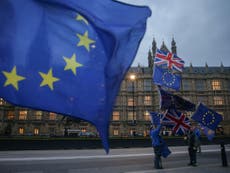Russia's disregard for international human rights has been emboldened by Brexit
Sergei Skripal's poisoning has been laid at Moscow's door – but it's Russia's potential withdrawal from the ECHR that should really concern us

There have been pugnacious words from the Foreign Secretary, Boris Johnson, in response to the suggestion that Russians appear to consider the UK fair game when it comes to despatching other Russians they regard as enemies of the state.
But what the extraordinary poisoning of Sergei Skripal really reveals about Russian-British relations is how unaccountable Russia has become. Russians – and let’s be frank, all fingers of suspicion are pointing east – apparently act with impunity in the knowledge that they won’t, and can’t, be held to a reckoning. While Moscow adamantly denies any state involvement, to many in Britain it seems as if Russians effectively have a licence to kill on these shores.
While the media in the UK relishes this most remarkable of real life spy dramas, the Russian state-run RIA news agency coincidentally let it be known just last week that Russia is considering withdrawing from the European Convention on Human Rights (ECHR). This, at a stroke would confirm that the pretence of accountability is over.
Apparently, say unnamed government sources in Moscow, too many cases before the European Court run counter to Russian interests. Even though the Duma vice speaker subsequently denied that ECHR withdrawal was on the agenda, he nonetheless queried the legitimacy of the court’s decision-making.
Russia does indeed have a shocking record at the Strasbourg Court. Case after case in Strasbourg testifies to the reality that human rights – including the right to life – are, at best, casually protected in Russia. If Russia does withdraw from the ECHR, it will be a seismic shift in global international relations. It will also be a disaster for the Russian victims of human rights violations, who at least have had Strasbourg to vindicate their rights up till now.
The topical shenanigans involving spies are not why Moscow has queried the validity of the European Court. The ongoing violations found against Russia are also not new. For many years the Strasbourg Court’s docket has been dominated by cases against Russia.
Why then, may Russia now be pursuing such an audacious anti-international human rights agenda that it would feel able to raise the question of ECHR membership? Why now do they seemingly feel able to give up on the charade of wanting to conform to the legal norms of a key part of the international community?
Despite Boris’s bellicosity, he and his fellow Brexiteers may share some of the responsibility for Russia’s new-found confidence in international relations. Russia and the UK, traditionally reluctant to engage in constructive diplomacy, have recently found themselves as cosy bedfellows in relation to the ECHR.
The UK’s frequently condescending attitude towards the Strasbourg Court has been taken by Russia as permission to hold the international rule of law in contempt as it relates to the adverse judgments of that Court. The UK’s intransigence over the Court’s finding that a blanket ban on prisoner’s voting rights violated the ECHR allowed Russia to take a similar position in relation to rulings on more serious human rights violations.
The idea that self-respecting members of the international community would denounce international human rights treaties used to be unheard of. North Korea tried once in relation to the UN’s main human rights treaty, the Covenant on Civil and Political Rights –and was told they couldn’t withdraw from membership. For many years, any diminution in international human rights protection was anathema. Why and how has this international consensus been splintered?
Well, there are several factors but not the least of them is Brexit. The EU has its own framework for safeguarding human rights, the EU Charter of Fundamental Rights, which works alongside the ECHR, but the Charter provides far more extensive protection.
Post Brexit, all EU law is to be retained, except the Charter. The UK is proposing to take the exceptional step of removing binding international human rights law from the jurisdiction. It doesn’t matter that retained EU law can’t work without Charter rights and that the deletion of those rights will mean the UK has significantly diminished human rights protection, the Charter is to go.
And by taking this step, the UK has set a precedent that Russia can follow. How can the international community remonstrate with Russia when they sit idly by as the UK rips up and rejects a human rights agreement overseen by an international court that it committed to be bound by?
“But the UK is leaving the EU”, some will cry. Why does that mean the UK will have flimsier human rights protection? When countries left Yugoslavia, they could not dilute their level of human rights protection as a result. The Prime Minister has been at pains to assert that we will have no lesser rights post-Brexit. Yet, the only way she can be sure of that is to make Charter rights part of retained EU law. Why doesn’t she?
“And the UK is still bound by the ECHR”, others will protest. That’s true – for the time being. Let’s not forget that the Prime Minister has already made her views on this subject clear. “It’s the ECHR we should be withdrawing from”, she said in 2016, “not the EU”. And the Tory party manifesto in 2017 committed the UK to the ECHR only for the lifetime of this Parliament. Conservative peer, Lord Faulks, recently reiterated that it is for each government to determine its human rights obligations: “no Parliament can bind its successor”.
All of this is music to Vladimir Putin’s ears. If the UK can tear up its commitments under the EU Charter, wilfully ignore decisions of the Strasbourg Court for years and threaten withdrawal from the ECHR at some point in the not too distant future, why shouldn’t Russia?
Undermining the universality and indivisibility of human rights threatens us all. If and when Russia withdraws from the ECHR its impact will be felt across the globe. Recently the outgoing UN human rights chief reminded us that it is violations of human rights that cause the chaos of conflict. He’s right. Russia may have ignored the rules set by the ECHR, but at least Russia is at present bound by them in principle. If it leaves, how else will the Russian state be held to account? Where else will victims whose rights have been trampled find redress?
As we live the consequences of Russia’s unbridled impunity, we will hanker after the parochial spy dramas of the past. And those Brexiteers who want to divorce the UK from its binding and enforceable international human rights obligation may regret playing so fast and loose with the UK’s framework for human rights protection.




Join our commenting forum
Join thought-provoking conversations, follow other Independent readers and see their replies